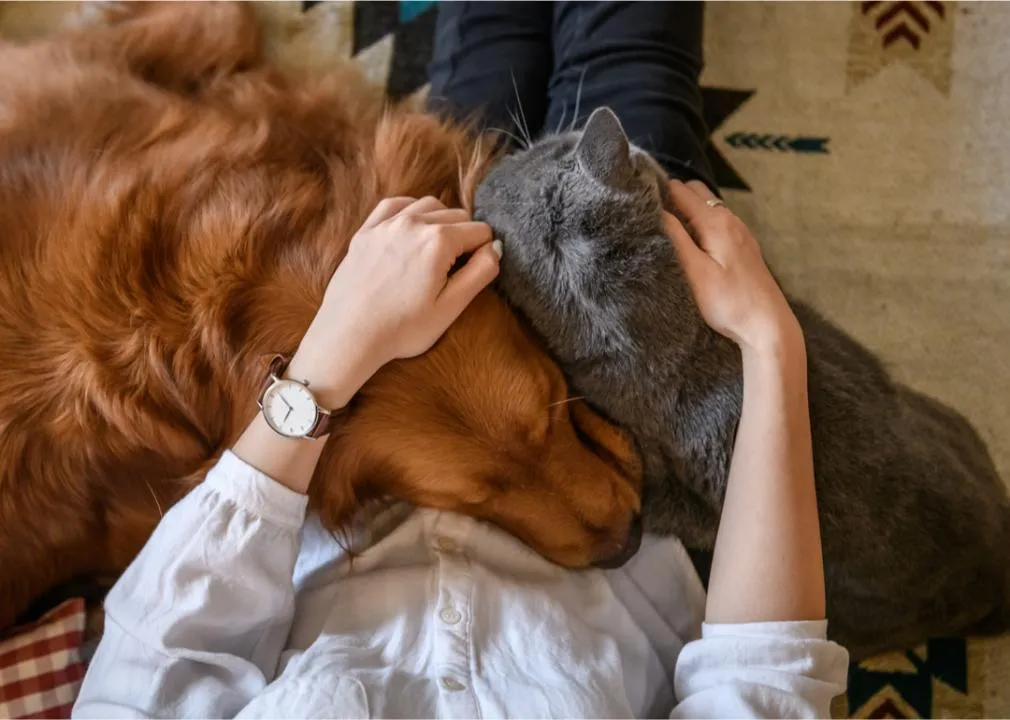How different generations treat their pets
Pets

Audio By Carbonatix
By Leesa Davis, Stacker

How different generations treat their pets
Since the beginning of 2020, the coronavirus has caused a surge in pet ownership in American households. Many people turned to pets to offset their loneliness as a result of social distancing guidelines. The number of people who chose to adopt pets skyrocketed during this time, and millennials took center stage as the largest pet-owning generation, surpassing baby boomers. Millennials tend to view their pets as “starter children.” For many millennials, this means spending more money than the average on their pets, taking them to a pet day care, throwing doggie parties for their “fur babies,” and of course posting their best-dressed pets on social media.
Baby boomers love their pets, and dogs have particularly become their empty-nest fillers. The baby boomer generation is from the era when dogs and cats slept in the backyard, not necessarily in a plush bed. Generation X views its pets as part of the family, but also feels its pets deserve companionship. It’s not unusual for this generation to have multiple pets.
ManyPets compiled data insights from several national surveys to break down the differences in how millennials, Gen Xers, and baby boomers treat their pets. The data explore how pet ownership changed amid the COVID-19 pandemic, along with spending habits. Generations are defined as follows: baby boomers born in 1964 or earlier, Gen Xers born between 1965-80, and millennials born between 1981-96.

Pet ownership across the generations
- Millennials: 32% of all pets
- Generation X: 24% of all pets
- Baby Boomers: 27% of all pets
In a survey conducted by American Pet Products Association in December 2020 and March 2021, millennials became the leading pet-owning generation, followed by baby boomers, and then Gen Xers coming in third. For baby boomers, many have grown children and owning a pet can help them feel as though they are becoming parents again. Members of younger generations, such as millennials, are waiting longer than previous generations to start families and as a result, tend to treat their pets as their children. Millennials and Gen Xers spend more money on their pets, especially when it comes to veterinary care.

Which pets does each generation prefer?
- Millennials: Dogs: 61%, Cats: 29%, Fish: 9%, Birds: 5%, Hamsters: 4%, Rabbits: 3%, Reptiles or amphibians: 2%, Other: 3%
- Generation X: Dogs: 52%, Cats: 41%, Fish: 14%, Birds: 9%, Hamsters: 4%, Rabbits: 3%, Reptiles or amphibians: 5%, Other: 5%
- Baby Boomers: Dogs: 37%, Cats: 29%, Fish: 6%, Birds: 2%, Hamsters: 0%, Rabbits: 0%, Reptiles or amphibians: 1%, Other: 1%
Based on an online survey conducted by TD Ameritrade between April and May 2020, one thing is for certain—each generation has a thing for dogs, with all three generations opting for canine companionship as their preference when it comes to pet ownership. Being a dog owner comes with a variety of physical and mental health benefits, from improving mood to even lowering blood pressure, making them a popular pet choice. Cats, the second-most-popular pets among the generations, have similar health benefits, although a link between cat ownership and a reduced risk of heart attacks was only found in cat ownership—not dog ownership.

How much do members of each generation spend on their pets every year?
- Millennials: $1,195
- Generation X: $1,100
- Baby Boomers: $926
Being a pet owner definitely comes with a price. A survey conducted by LendingTree in August 2021 showed American pet owners spend an average of $1,163 per year on their furry family members. The funds are spent on food, treats, and even toward social media content. The survey also found that 45% of pet owners would have to take on debt to cover an unexpected purchase, such as a medical expense, of $1,000 or more. For those who participated in the survey, 98% spend an average of $86 per month on their pet and 8% are currently in debt for pet expenses.

What share pays for a monthly pet supplies subscription box?
- Millennials: 10%
- Generation X: 7%
- Baby Boomers: 3%
Many people underestimate the costs associated with being a pet parent. With the popularization of subscription services across a variety of industries and supply chains, it's no surprise subscription boxes have found their way into the pet world. Luxury accessories and toys have continued to be a large cost associated with pet ownership, with millennial pet owners particularly leaning into the trends. Millennial cat owners spend $915 per year on their pet and are willing to spend up to $2,000 if their pet were to get sick. Among millennials, 40% said they spent money on their pets for social media posts (for instance, buying props or outfits). Meanwhile, 21% of Gen Xers spent money for social media posts, and just 8% of baby boomers. A survey conducted by LendingTree in 2021 found that baby boomers are least likely to go into debt for their pets and generally spend less on their furry companions than other generations. Pet food and treats accounted for the majority of spending among pet owners with $42 billion worth of sales in 2020.

Nearly everyone agrees: Pets are our 'fur babies'
- Millennials: 75% agree
- Generation X: 80% agree
- Baby Boomers: 75% agree
Millennials have clearly proven they are pet lovers, with 7 in 10 owning their own fur babies—61% being dog pet parents, while 29% own a cat. Millennials view their pets more as children and are the generation most likely to splurge on luxury items for their furry companions. Baby boomers view their pets more as extended family members, while Gen Xers believe their pets can find companionship with other pets. Compared to other generations, Gen Xers are likely to own two dogs.

























